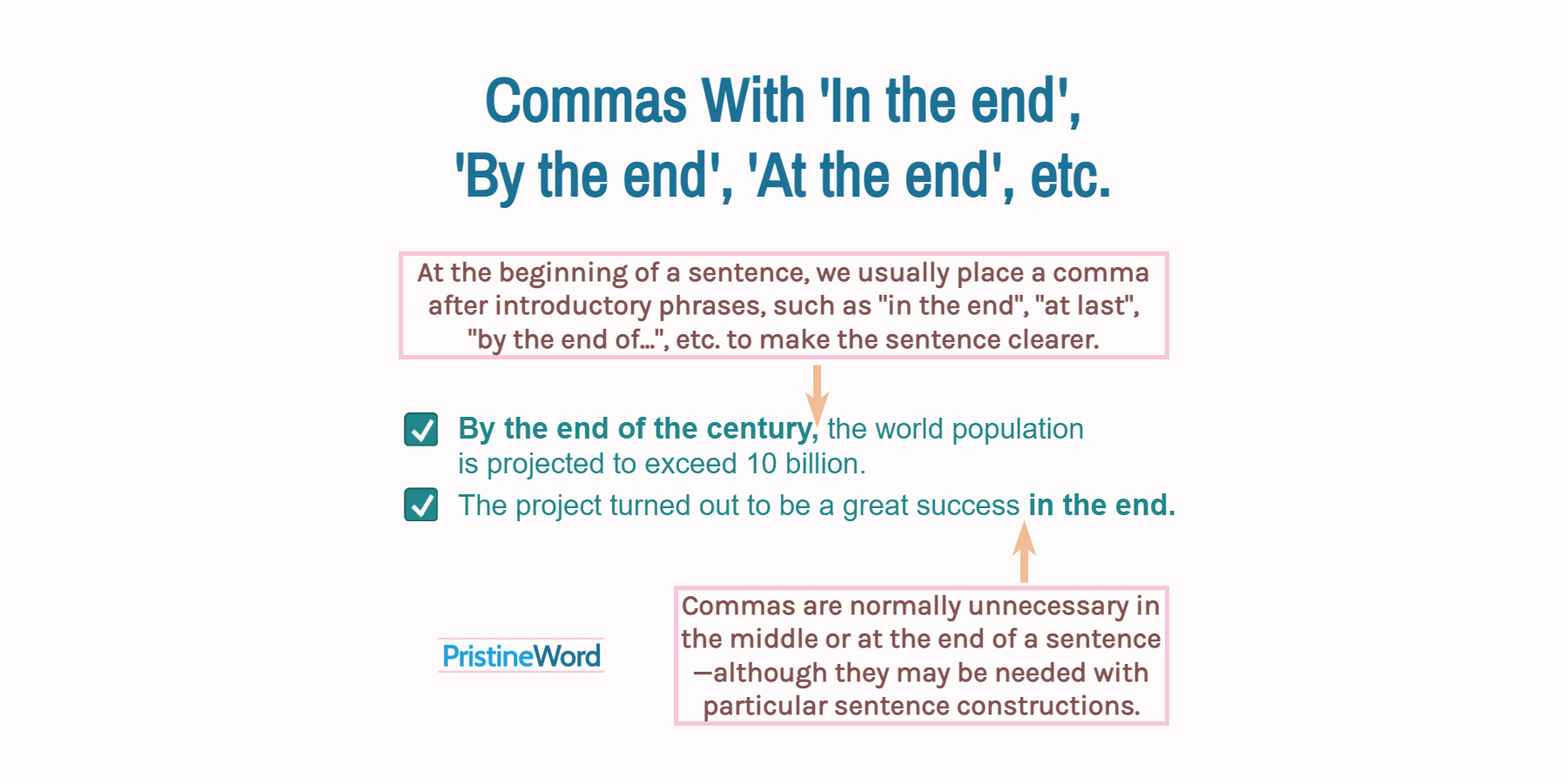At the beginning of a sentence, we usually place a comma after introductory phrases, such as "in the end", "at last", "by the end of...", "at the end of...", or "at the latest" to make the sentence clearer.
At the beginning of a sentence, we usually place a comma after introductory phrases, such as "in the end", "at last", "by the end of...", "at the end of...", or "at the latest" to make the sentence clearer.
By the end of the century, the world population is projected to exceed 10 billion.
Commas are normally unnecessary in the middle or at the end of a sentence—although they may be needed with particular sentence constructions.
The project turned out to be a great success in the end.
Contents
1. Differences among 'In the End', 'At the End', 'At last', etc.
- "At the end" refers to the final part of an event or period of time. "At the end" is usually followed by "of" (e.g., "At the end of the novel, they get married.")
- "By the end" simply means that something has happened before the end (e.g., "By the end of the month, all her work was done.")
- "In the end", "finally" or "eventually" are typically used to express that something happened after a situation has evolved, or something has been discussed or thought (e.g., "John was wondering how to get home. In the end, he called a taxi.")
- "Lastly" is a way to say that something happens last in a series of events (e.g., "Lastly, please make sure you don't leave your things behind.")
- "At last" can be used to express that something has happened after you have been waiting for it for a long time (e.g., "At last she arrived.")
- “At the latest” indicates that something must happen at or before a particular time and not later (e.g., “He should be back by nine o’clock at the latest.”)
2. When to Use Commas With These Expressions
At the beginning of a sentence, we usually add a comma after an introductory phrase, such as "at the end of...", "by the end of...", etc.
At the end of a sentence, you should put a period.
But the comma is optional if the introductory sentence is short (less than five words) and clear.
In the end they get married.
Some style guides argue that clear introductory phrases starting with a preposition, such as "at the end of...", "at last", "by the end of...", "in the end", etc., may not need a comma even if it contains more than four words.
At the end of the match everybody went home.
At the end of the day I go to bed.
When in doubt, use a comma to make the sentence clearer.
At last, I've finished writing my novel!
In the end, an independent commission can reveal the truth.
Recommended: When to use a comma after "in the beginning", "at the beginning of...", etc.
In the middle or at the end of a sentence, a comma before or after these phrases is often unnecessary.
My wife wanted to do it, but in the end she didn't.
This project needs to be completed by Friday at the latest.
Similarly, we do not generally use a comma after "finally" or "eventually" when modifying a single word (verb, adjective, or adverb) in mid-sentence.
Put the chicken in a pot, add two carrots, cover with cold water, and finally simmer until the chicken meat falls off of the bones.
Occasionally, however, commas may be required to set off nonessential information, interrupt the sentence flow, add emphasis, or separate a series of coordinate phrases or clauses.
She had a car accident, at the end of July, caused by a drunk driver.
When the truth comes out, at the end of a long story, make the right decision, say goodbye, and don't look back.
You can follow a similar strategy to decide when to use commas with the expression "in the middle of...".

